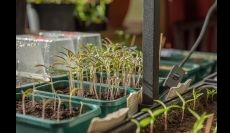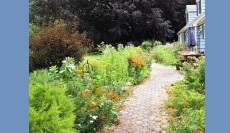|
Empty
Welcome
Visitor
Browse Courses
Sort by:
Default

2026/07
Plants can be identified in the winter! It is more difficult than when plants have leaves and flowers but it is possible. We'll meet at the Middlesex County Extension Center, walk around the grounds, then walk down to the train tracks (CT Valley Railroad State Park) for additional plant id opportunities. Please dress for the outdoors and wear sturdy shoes and appropriate clothing. Bring a walking stick, if desired.
More
 Starts:
3/5/2026
10:00 AM
Starts:
3/5/2026
10:00 AM
 Ends:
3/5/2026
12:00 PM
Ends:
3/5/2026
12:00 PM
 Duration:
2 hours
Duration:
2 hours
 Credits:
2 Class Hours
Credits:
2 Class Hours
 Pricing:
Pricing:
 Location:
Location:

2026/03
Join Windham County coordinator John Lorusso for online seed starting class. We will explore methods for growing vegetables and flowers from seed. We will discuss schedules, materials, and infrastructure necessary for success with seedlings. We will also cover different strategies for propagating plants. Bring your knowledge and experience as well, we want to hear what has worked for you. Hopefully you will come away with the confidence to try growing some of your plants from seeds and cuttings allowing you a larger garden for more flowers and vegetables and more weeding!
More
 Starts:
3/8/2026
1:00 PM
Starts:
3/8/2026
1:00 PM
 Ends:
3/8/2026
3:00 PM
Ends:
3/8/2026
3:00 PM
 Duration:
2 hours
Duration:
2 hours
 Credits:
2 Class Hours
Credits:
2 Class Hours
 Pricing:
Pricing:
 Location:
Location:
 Status:
64 open seats left
Status:
64 open seats left

2026/09
This class explores the five-century history of botanic gardens as centers of education, conservation, art, and tourism, from their origins in 16th-century Europe to their global prominence today. Drawing on more than 30 years of travel and research, Dr. Richard Benfield guides participants through over 80 iconic gardens across six continents, examining how botanic gardens evolved from teaching collections into major cultural, economic, and wellness destinations. The class highlights the extraordinary diversity of the world’s great gardens, explains why garden visiting has become one of the most popular forms of tourism, and reveals what makes these places so enduringly valuable, beautiful, and relevant for Master Gardeners and garden enthusiasts alike.
More
 Starts:
3/11/2026
7:00 PM
Starts:
3/11/2026
7:00 PM
 Ends:
3/11/2026
8:30 PM
Ends:
3/11/2026
8:30 PM
 Duration:
1 hour
30 minutes
Duration:
1 hour
30 minutes
 Credits:
2 Class Hours
Credits:
2 Class Hours
 Pricing:
Pricing:
 Location:
Location:
 Status:
78 open seats left
Status:
78 open seats left

2026/04
Microgreens are a delicious and beautiful crop you can grow year round. Join John Lorusso Windham Master Gardener Coordinator for a lecture and demo on microgreens. Topics include light requirements, growing mediums, growing containers, varieties, seeds and seeding density, how-to grow and harvest. We’ll also cover nutrient density and recipe ideas. The workshop includes planting your own tray of microgreens to take home ($10 fee).
More
 Starts:
3/15/2026
1:00 PM
Starts:
3/15/2026
1:00 PM
 Ends:
3/15/2026
4:00 PM
Ends:
3/15/2026
4:00 PM
 Duration:
3 hours
Duration:
3 hours
 Credits:
2 Class Hours
Credits:
2 Class Hours
 Pricing:
Pricing:
 Location:
Location:
 Status:
5 open seats left
Status:
5 open seats left

2026/06
Agroforestry consists of a series of agricultural practices that includes trees to help improve soil health and infiltration, increase biodiversity, and diversifies marketable crop products. Agroforestry has been practiced around the world for millennia and is now taking hold in Connecticut. Food forests, forest farming, alley cropping, silvopasture, and windbreaks and riparian buffers will be discussed, as well as marketing and funding opportunities. This talk will introduce the concept of permaculture gardening along with the trees used in agroforestry systems.
More
 Starts:
3/18/2026
6:00 PM
Starts:
3/18/2026
6:00 PM
 Ends:
3/18/2026
8:00 PM
Ends:
3/18/2026
8:00 PM
 Duration:
2 hours
Duration:
2 hours
 Credits:
2 Class Hours
Credits:
2 Class Hours
 Pricing:
Pricing:
 Location:
Location:
 Status:
93 open seats left
Status:
93 open seats left

2026/08
Soils are a complex ecosystem with a diverse community of organisms. These organisms are vital to the cycle of all life on earth. Come explore the soil food web and learn about its components, functions and how you can encourage these essential lifeforms.
More
 Starts:
3/25/2026
1:30 PM
Starts:
3/25/2026
1:30 PM
 Ends:
3/25/2026
3:30 PM
Ends:
3/25/2026
3:30 PM
 Duration:
2 hours
Duration:
2 hours
 Credits:
2 Class Hours
Credits:
2 Class Hours
 Pricing:
Pricing:
 Location:
Location:
 Status:
82 open seats left
Status:
82 open seats left

2026/05
It is tempting to think of a foundation garden as simple decoration around the base of a building. Yet the garden areas at our doorsteps and outside our windows have surprising potential for greater benefits. This seminar offers a fresh approach that incorporates native plants for wildlife, protects dark skies, and increases our sense of safety and well-being. Come away with a variety of recommendations for updated designs that work in today's environment.
More
 Starts:
9/17/2026
10:00 AM
Starts:
9/17/2026
10:00 AM
 Ends:
9/17/2026
12:00 PM
Ends:
9/17/2026
12:00 PM
 Duration:
2 hours
Duration:
2 hours
 Credits:
2 Class Hours
Credits:
2 Class Hours
 Pricing:
Pricing:
 Location:
Location:
 Status:
89 open seats left
Status:
89 open seats left
|

